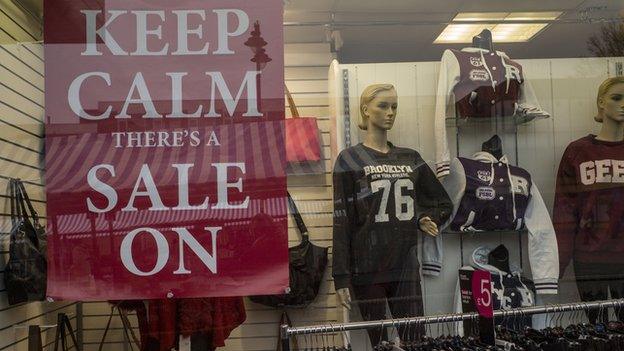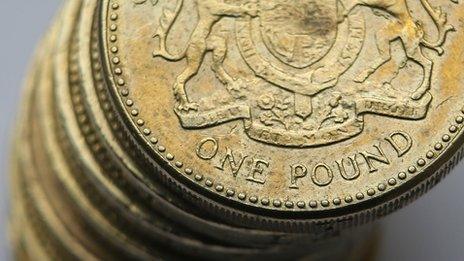Don't be scared of deflation, yet
- Published
- comments

A bit of history has been made with the disclosure that prices fell 0.1% in April - because the consumer price index has never before dropped since official records began in 1996.
And on an estimated basis, the last time we saw a price fall in the UK was March 1960, before even I was born, when there was a drop (probably) of 0.6%.
So my natural impulse is to say that deflation has arrived in Britain - because there is no other word in the English language than "deflation" to describe this phenomenon.
However many of those who define themselves as "serious economists" (that's not me, by the way - I'm a hack) are desperately anxious that I and you don't use the "d" word - for two reasons.
'D' word fears
One is that they say proper deflation is a long term term trend of declining prices, and they believe - almost certainly correctly - that these current price falls won't endure much more than a month or two.
The other is that proper deflation is pernicious: if we believed that prices were set to fall month after relentless month, we would spend less - in the hope of picking up bargains later - and our bosses would pay us less.
That would place a deadening weight on our ability to grow the economy - a weight made heavier by the intractable problem of our massive household debts, in that our capacity to service those debts is diminished when incomes don't grow.

Or to put it another way, there is a fear - in the Treasury and the Bank of England - that if you and I talk too freely about deflation having arrived, we would acquire a deflationary mentality and bring on the terrible malaise - and the UK could find itself turning into stagnating Japan.
My suggestion therefore is that, for now at least, we talk about what's occurring as either mild deflation or non-pernicious deflation or even - as I've styled it before - "good" deflation.
Just to be clear, the fact that there've been falls in the prices of essentials - food, non-alcoholic drinks and transport - actually increases our standard of living in the short term.
Because we have no choice but to eat, when food prices fall, our money goes further - and we are better off.
So this kind of deflation may in fact be stimulating consumer spending and economic activity.
Hooray for "good" deflation.
Cause of concern
That said, although there is no reason to panic that prices are falling, it would equally be foolish to pretend that the causes of this deflation are benign.
The initial spur to the current fall in prices was last year's collapse in the oil price - which was in part due to an unexpected slowdown in the global economy, especially in China and the eurozone.
And that led the European Central Bank to cut the cost of credit to less than zero, which in turn led the euro to slide, which meant that the price of all that stuff we buy from the eurozone dropped - or to put it another way, the ECB exported the eurozone's deflation to us.
There are at last signs of a mild revival in the eurozone - though the precariousness of Greece's ability to pay its huge debts mean that revival isn't yet wholly bankable.
And the oil price has risen 50% from its lows of a few weeks ago.
So this bout of relatively benign deflation should be transformed into mild inflation within the coming weeks.
No need to panic therefore about today's bit of history.
But as Mark Carney conceded only a few days ago, the Bank of England cannot ease up on its vigilance in trying to steer price rises back to the target rate of 2% a year.
Because unless we experience a bit of proper inflation back in the system, we'll never break the shackles of our cursed enormous debts.